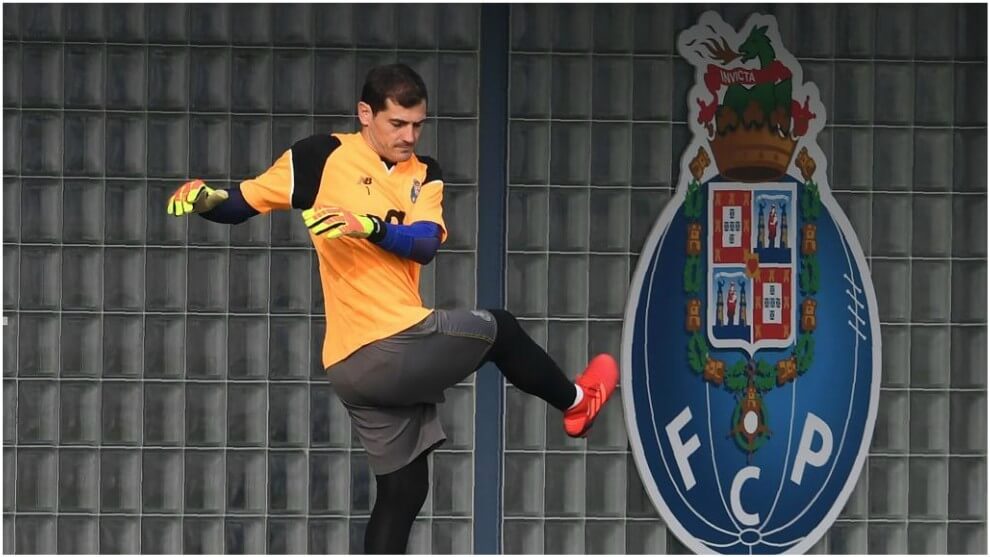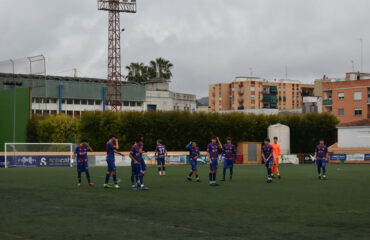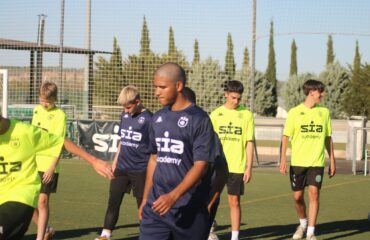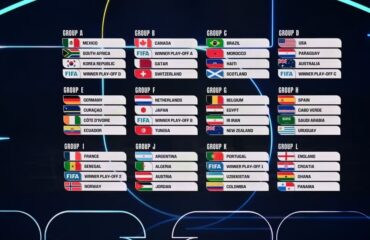PSYCHOLOGICAL COMPETENCE AS A DETERMINING FACTOR IN SOCCER GOALKERS AT FC PORTO Dragon Force and Soccer-Inter-Action
The goalkeeper, that figure so distinct in football that only those who have put on the gloves and faced the onslaught of opponents looking for a goal to beat you know in real depth.
If we were asked to try to describe the main traits that characterise a football goalkeeper, perhaps the first thing that comes to mind is that a goalkeeper must be “crazy”. Far from jokes and popular sayings, this conception about goalkeepers is the result of the great load of personality that they must demonstrate once they step onto the pitch or training sessions. This is why the conception that they must be qualitatively different from others, and by definition “weird”, in the strict sense that they are out of the norm, is true.
The psychological plane is becoming increasingly important in sports training, but it is in the figure of goalkeepers in which psychology plays a more crucial role than in any other position in the team for the aforementioned reasons. For this reason, it is necessary that goalkeepers receive more psychological guidance in their training than other players. Acting on the psychology in goalkeeper training should be one of the premises to be followed.
Why are psychological skills so important in a soccer goalkeeper?
As we have been saying, the goalkeeper embodies in his role one of the roles that is most dependent on mentality and therefore conditions his preparation in terms of training. But I would not want to err on the side of generalism and not present the reasons why they depend so much on a solid and prepared mentality.
Therefore, I would like to list in detail below the various psychological factors that affect the goalkeeper in terms of performance and, drawing on my experience from my direct work at FC Porto Dragon Force, explain how to approach the development of these factors in order to achieve constant improvement and success. The training of football goalkeepers should be systematically one of the tasks to be improved in any high performance football school.
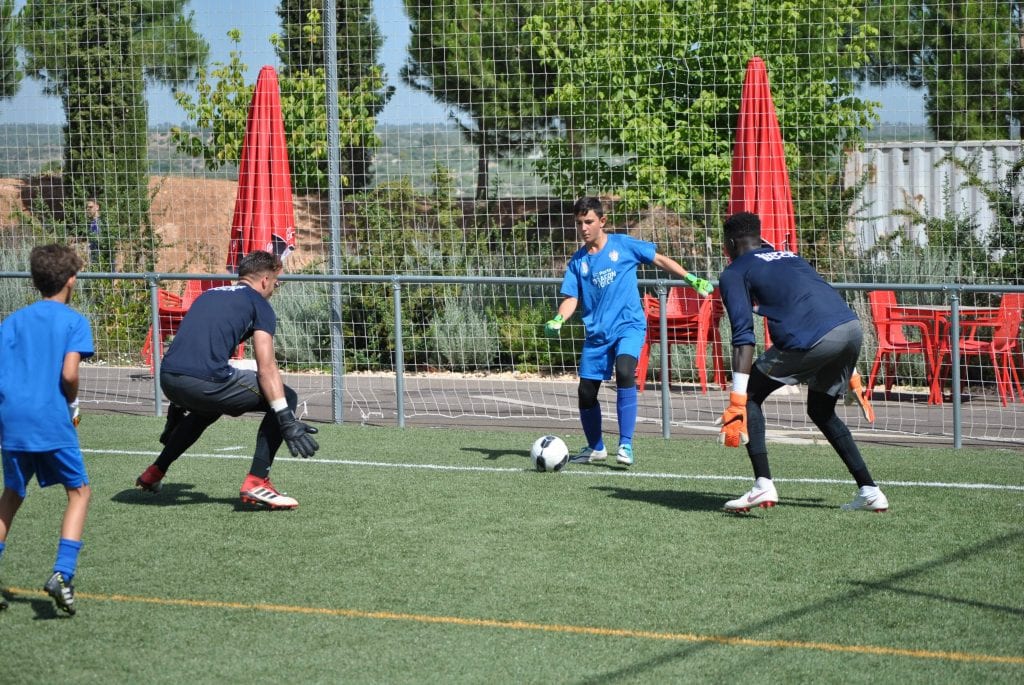
Radiography of the Goalkeeper. Determining psychological factors
It is true that there is a great deal of agreement about how difficult it is to be a goalkeeper. But when you try to describe it and put it into words, it is more than difficult to transmit it in a way that others understand. Each situation in the game has certain characteristics that need to be worked on and improved in training, and depending on the performance and success that the player shows, it will have a greater or lesser impact.
Let us try to see, in as much detail as possible, what conditions and mental capacities a football goalkeeper must have in order to handle the different demands that a match places on them.
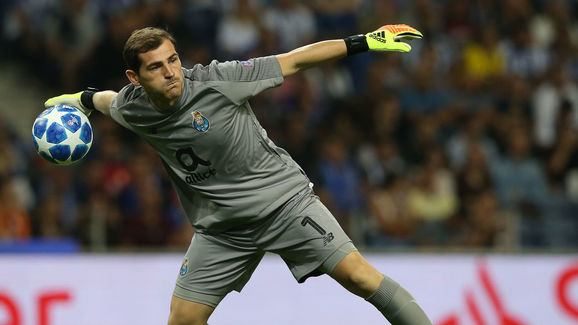
– The pressure to be a “saviour
In the team’s line-up when it comes to taking the field, there are four distinct lines: goal, defence, midfield and forwards. It doesn’t take much thought to realise that the only line that doesn’t have more than one player is the goalkeeper, so the responsibility of being a goalkeeper plays a crucial role. As only one of the eleven, being the only one in charge of this function makes it impossible for the effect known in psychology as the diffusion of responsibility to occur. This effect is the “culprit” that in situations with a multitude of people present, we feel less responsible for the consequences, or even feel directly less responsible for acting to solve the problem. The doorman does not have the option of removing the responsibility from himself, so the only way to solve his interventions is to act, facing the situation without hesitation.
It is important that the goalkeeper learns to handle the pressure of such a level of responsibility, because as the only one capable of making such interventions, he will bear the burden of both successes and mistakes.
– Own conception of their interventions in the game
The goalkeeper must understand that the fact that he has to intervene must not generate fear in himself, or in his own team. He must see his own interventions as part of the development of the game, and even look forward to them in order to challenge himself.
This detail is of the utmost importance, since the goalkeeper who is not fully prepared interprets his own interventions as the opponent’s arrivals, and brings fears and insecurities to mind, both for himself and for the team. Seen from this erroneous perspective, the goalkeeper will hope that no balls come into his domain, and in case they do, he will save them in a distrustful and hesitant manner.
It is useful to work on the meaning of “chance against goal” to associate it with opportunities to prove his worth, so that the goalkeeper, far from fearing that his goal will be approached, will wait with full confidence for the moment to bring his abilities into play and prove himself in a positive and confident manner. It is only in this way that he will increase his chances of intervening correctly in the match.
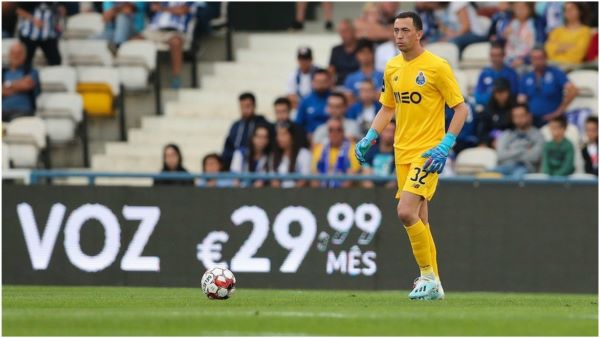
– Error management
A very decisive element in any sport is error. Failing is a major emotional impact for any athlete because, depending on the direct consequence of the error, it may take you further or further away from your goal of success.
But in the case of football, its rules and peculiarities mean that a goalkeeper’s mistake has notably more intense consequences than in other plays in different positions on the field. In the first place, the consequence of a goalkeeper’s mistake is most likely to be a goal conceded. As if this were not hard enough, there is the added burden of the fact that in football it is not often that a goal is conceded, so the importance of not conceding a goal nowadays becomes paramount.
The goalkeeper needs to have the necessary psychological tools to be able to accept the mistake, and to generate in himself an ability to move forward. It is not an option to remain stuck in the past, continually bringing up negative thoughts. Interpreting the mistake in an intervention as part of the game will be a vital step for the goalkeeper to be able to recover and continue to perform at the highest level for the remainder of the game.
– Bombproof self-confidence
That successful sportsmen and women are characters with great confidence in their own abilities and skills is common knowledge. But it is in the case of goalkeepers that we must place special emphasis, since the goalkeeper must have a completely solid, sincere self-concept and identify himself as capable of anything.
If the goalkeeper associates his image with that of someone capable and with the necessary skills to cope with the sporting demands of matches, it is more likely that his performance will be influenced in a positive way and therefore believe that he is capable in any type of scenario, i.e. his performance will be more regular. This variable is closely linked to the error management mentioned above, so that high levels of self-confidence will help to manage error more effectively. Goalkeeping coaching courses actively work on the self-confidence factor.
Self-confidence is a determining psychological factor when it comes to performing consistently over time. And it is this very consistency that makes or breaks a goalkeeper’s success in the world of football.
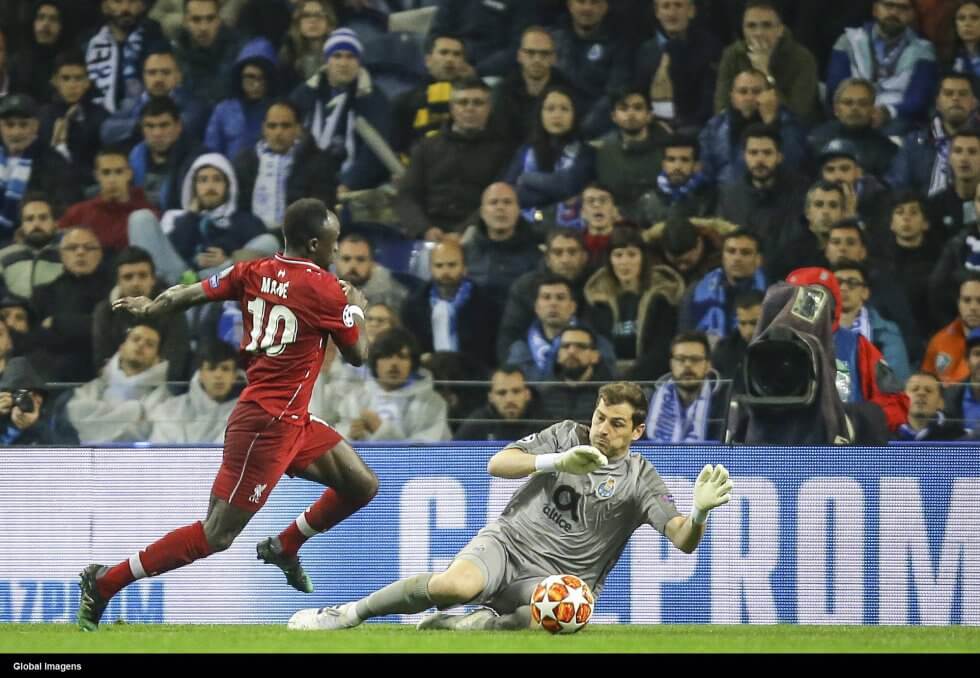
– Real and healthy patience
When we talk about patience with regard to goalkeepers, the main determinant that can influence this factor is that of being a starter. Being a starter or not in a team’s goal plays a crucial role in the goalkeeper’s personal and sporting development.
As we said before, there is only room for one goalkeeper in the starting eleven, and therefore the coach must decide based on the current state of his goalkeepers. Although there are other factors that influence this decision, such as: regularity of the goalkeeper, experience of the goalkeeper, handling different competitions (if any), or even wanting to maintain the initial bet in order to transfer confidence from the beginning.
The goalkeeper must constantly keep his long-term goal in mind, even if he is a starter. The fact of being a starter or not, sometimes, does not mean that the one who does not play is not in good shape or does not have a good level. The focus of the goalkeeper’s work must be a constant competition with himself in order to keep improving, if he works in the right way, time will put him in the place he deserves.
– The leader under the sticks
The goalkeeper has the important function of directing the team, has a privileged position on the pitch in terms of vision of the game, and controls most of the information about what is happening on the field. Therefore, he must be able to transmit the message and organise according to what he is able to see.
In addition, another of the common functions of a goalkeeper is to send messages as an emotional regulator of the team depending on the moment of the match. Thus, the goalkeeper should not hesitate to express messages of encouragement in moments of difficulty, information that reactivates the team in periods of lack of concentration, as well as security in situations of uncertainty or failures at the back.
To perform these communication tasks effectively, it is important that the goalkeeper has and develops leadership skills to put into practice once the match begins. One of the dimensions of leadership that will most influence the effectiveness of this communication task is emotional intelligence. That is to say, it will depend on the goalkeeper’s ability to understand the team’s state of mind, to adapt the message and to give it sufficient empathy. When we talk about empathic charge, we are referring to the quality of the message being identifiable for the rest, and that it moves those to whom the message is conveyed to action.
When it is said that goalkeepers must have personality, it actually means that they must embody strong character traits, show no signs of hesitation in decision-making (both on and off the field) and have strong leadership skills.
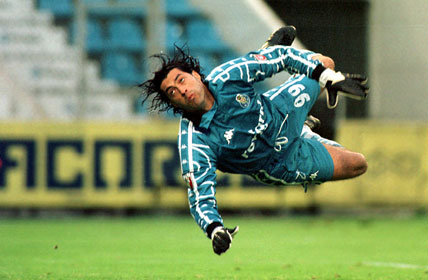
– Concentration
The goalkeeper’s performance is much more special and specific than that of other players (more intermittent, fleeting and “decisive” plays). In the development of a football match, the time that a goalkeeper has a direct impact on the ball is minimal, but the repercussion of his actions is, as mentioned above, substantially more important or definitive than other types of plays can be.
Understanding concentration in the strictest possible sense, we are referring to where the goalkeeper focuses his attention and when he does so. This attention will vary throughout the game, in this way, in plays in which we are attacking, the goalkeeper must have a wide and external attention in order to gather as much information as possible. In direct intervention plays such as a dive after an opponent’s shot, the goalkeeper’s attention must be reduced and external.
The focus of attention may vary throughout the different game situations, but what is of utmost importance is that the goalkeeper must be constantly alert throughout the entire game. This is not an easy task since, to repeat the above, the direct action of goalkeepers is minimal in proportion of time and it is very easy for attention to lapse at some point.
– Activation in the course of the match
The goalkeeper’s direct interventions in the development of the match are so intermittent that he must be prepared to remain “inactive” for long periods of time, and to work at the maximum level of attention and reflexes when a sudden counter-attacking play arrives.
There is a danger that when the time comes to intervene, the goalkeeper will not be at the required level of activation as a result of having been stationary for a considerable period of time.
To avoid this effect, the goalkeeper must conceive of the match as 95 minutes in which there is no rest (outside of the half between the two halves of play), and keep the body permanently alert despite not having the ball close to him. This is not an easy task since the natural tendency of the organism is to relax if danger is not near. You must teach your mind to work even when the stimulus is not present.
– Motivation as fuel
Motivation does not refer to the desire to do something as it is commonly conceived, but motivation is the reasons why you want to carry out an action. It is important, as in all other sports, that those who want to progress and improve in search of their maximum sporting performance have a well-established hierarchy of objectives from the short to the long term, as well as knowing perfectly why they have embarked on this training path.
The establishment of objectives for a season, as well as longer-term objectives referring to their professional career in general, will be an elementary exercise that will help the goalkeeper to continue the line of work regardless of results, criticisms, ownership, possible conflicts in the dressing room, etcetera. Being clear about where he wants to be will be a crucial support that will underpin his ability to pick himself up in the face of adversity, or to improve even further when he is in good shape and performing well.
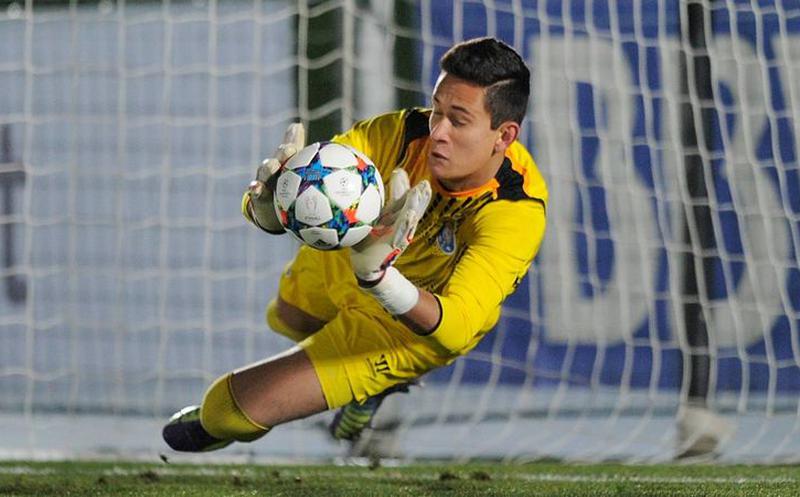
DESIGN AND IMPLEMENTATION OF PSYCHOLOGICAL TRAINING IN FC PORTO
All these pieces of the puzzle are necessary to work directly with the goalkeeper on a daily basis, so that he acquires the necessary knowledge and skills to develop both his physical and mental capacities in the most competitive way possible.
To carry out this complete training, FC Porto Dragon Force works in different phases that follow logical principles of progression and facilitate the teaching of skills to the goalkeeper. How to become a goalkeeping coach? The main figures in charge of this work are the coach, the goalkeeping coach and the sports psychologist. By establishing a constant channel of communication (either directly or indirectly) between them, constant feedback is given on how the process is going, and what needs arise over time.
Thus, the process begins at an early stage, which is the design of the training. The aim is to build a comprehensive framework for goalkeeper specific training, in which the technical, tactical and mental aspects are coordinated so that the whole process of goalkeeper development goes hand in hand in order to improve all the elements that we have analysed above. In the design phase, the necessary information is gathered about the capabilities of the goalkeeper to be trained. Depending on his baseline, priority is given to one or another exercise.
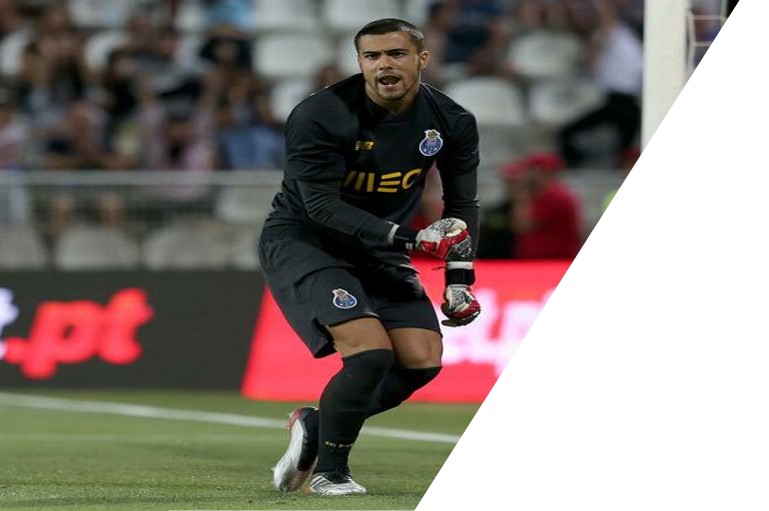
The next phase of training is the implementation of work, i.e. the actual training, How to train a football goalkeeper, conventionally known and implemented by the goalkeeping coach. With detailed work and a variety of exercises, the goalkeeper carries out the process of acquiring both motor and analytical skills. The aim is to automate movements and positioning in order to make way for as many mental resources as possible to make effective decisions. In other words, by consolidating concepts and leaving them automated, the attention will be as clear as possible in order to analyse and make the best decision quickly and effectively.
Once the training session (or sessions) is finished, we proceed to act from another qualitatively different environment, which is the work carried out by the sports psychologist. The way to approach this phase can be either integrated in the field in your training sessions, or privately in individual sessions to define how to be a good goalkeeper. The individual approach is concerned with covering the psychological factors listed above in a way that, through awareness, self-assessment and external guidance from observers, the goalkeeper works on his mental capacities for the game.
One of the major concerns that we at FC Porto Dragon Force are working on developing extensively is the generation and presentation of contexts for reflection in order to consolidate learning. It is not enough to practice 150 football goalkeeper training exercises. A perfect balance between presenting concepts and working on them (theory and practice united and integrated) will allow the goalkeeper to reach the top and stand out from the rest.
JAVIER RIVERA TRIGUERO
PSICÓLOGO DEPORTIVO Soccer Inter-Action & FC PORTO-DRAGON FORCE



